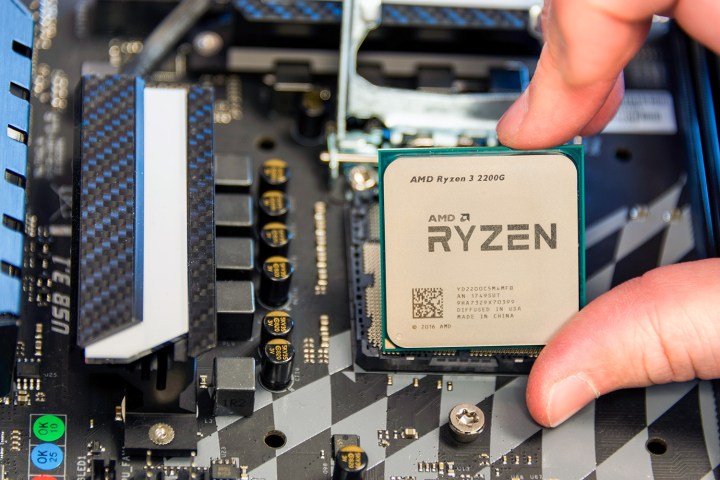
AMD made quite the comeback with its first Ryzen processor, but that was several years ago. Now, ahead of the release of AMD’s Ryzen 3000 series processors for desktops, we’re already starting to see benchmarks for the mobile variants of the company’s next-generation processor leaked. These processors are part of the Picasso family and are designed for ultra-low power consumption. Benchmark results for the Ryzen 3000 APU — which AMD calls an application processing unit, as it combines AMD’s processor and graphics capabilities on a single chipset — were published on Geekbench, showing the chipset family running on a number of laptops made by HP in 14- and 17-inch sizes.
The chipsets in the Ryzen 3000 APU series include the 300U, 3200U, 3300U, 3500U and 3700U, with the 300U believed to be a low-end Athlon chip, according to Tom’s Hardware. All the other APUs appear to integrate AMD’s Radeon Vega Mobile graphics. Aside from the 300U, other APUs in the series come with either two cores and four threads, four cores and four threads, or four cores and eight threads. Geekbench lists the processor’s hardware architecture as Raven Ridge, so it may be based on a similar platform.
When Raven Ridge debuted in late 2017, it was based on a 14nm manufacturing process at the time. On the desktop side, at least, AMD is believed to be moving forward with a 7nm architecture for Ryzen 3000 CPUs, which would allow the company to overtake larger rival Intel, which has struggled with yields on sub-12nm chip designs.
Though Geekbench didn’t have single-core or multicore scores for all the 3000 series APUs, the best scores published were from the 3500U — a quad-core, 8-thread processor — which got a high of 3,870 points on single-core tests and 11,284 on multicore tests. The chipset is said to have a 2.1Ghz base speed, but its boost speed wasn’t available on Geekbench. The 3500U is expected to succeed the current Ryzen 5 2500U, so the new chip will likely feature a total of 8 CUs (Compute Units), the equivalent of 512 stream processors, according to Wccftech.
For comparison, Geekbench lists the single-core performance of Intel’s 8th-Generation Core i5-8250U in the 4,500 range, and multicore performance sits in the 14,000 range when tested on a Windows system. Given the ultra-low-power nature of the Ryzen 3000 APUs, the scores are more competitive against Intel’s Y-series processors, which are more commonly referred to as Core M. The 8th-generation Intel Core i7-7Y75- which is found on Apple’s MacBook, posted a higher score in the 4,200 range for single core, but significantly lower multicore results in the 7,000 to 8,000 range, depending on the laptop used for testing.
With CES around the corner, we will likely hear more about AMD’s plans in the processor space soon, both in desktop and in mobile.
Editors' Recommendations
- Gigabyte just confirmed AMD’s Ryzen 9000 CPUs
- Intel said AMD’s Ryzen 7000 is snake oil
- How Nvidia and AMD could make Windows laptops feel like MacBooks
- Where in the world are all of AMD’s next-gen laptop GPUs?
- Take a look at AMD’s limited-edition, Starfield-themed GPU



